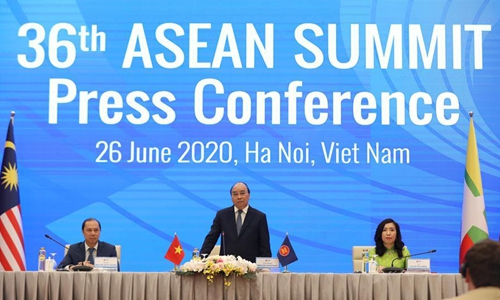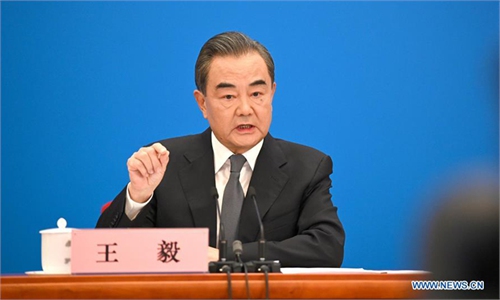
Vietnamese Prime Minister Nguyen Xuan Phuc (C) attends a press conference of the 36th ASEAN Summit in Hanoi, Vietnam, June 26, 2020. Photo: Xinhua
The 36th Association of Southeast Asian Nations (ASEAN) Summit on Friday was held via teleconference. In regard to the South China Sea issue, the ASEAN statement said, "We reaffirmed that the 1982 UNCLOS [United Nations Convention on the Law of the Sea] is the basis for determining maritime entitlements, sovereign rights, jurisdiction and legitimate interests over maritime zones." Three anonymous diplomats from Southeast Asia told the Associated Press that the statement indicated the group wants to strengthen its assertion of the rule of law in the South China Sea region. Some foreign media outlets hyped that the statement targeted China in particular.Compared with ASEAN's previous statements over the South China Sea, this statement did seem to enhance their assertion over the disputed waters. Several factors contribute to it.
China hopes to conclude the negotiations with ASEAN members on the Code on Conduct (COC) in the South China Sea by 2021. This benchmark for a three-year program was set in 2019 and is now in its second year of negotiations. Indeed, this year is crucial to the talks for resolving many core interests of the parties.
It is rational that ASEAN members intend to maintain their claims and defend their interests in the upcoming talks with China. The stronger assertion in the latest statement reflects this intent. Of these parties, Vietnam seems to be making the most claims. By virtue of being ASEAN's rotating chairmanship this year, Hanoi may entice other countries to try to maximize their interests in the COC talks with Beijing.
Additionally, US repeated interference in the region may also ramp up ASEAN's confidence in strengthening its assertion over the South China Sea. Washington believes South China Sea affairs directly affect its interests, so it will not want to be absent from COC talks.
Besides, most of the maritime disputes in the South China Sea region are only between China and a few members of ASEAN. The South China Sea issue will not become an obstacle to maintain friendly relations between China and the bloc. As China's largest trading partner in the first quarter of 2020, ASEAN members also understand that upsetting relations is detrimental to their interests.
Recent months have seen tensions between China and Vietnam and Indonesia over the South China Sea issue. Recent conflicts sparked between Beijing and Hanoi are mainly due to friction pertaining to undersea oil or gas exploration. Beijing and Jakarta are in a spat about overlapping claims over maritime rights in parts of the South China Sea.
How might China cope with ASEAN's stronger assertions and the increased pressure from Vietnam and Indonesia over the South China Sea?
China should use existing bilateral mechanisms to negotiate with Vietnam and Indonesia, and seek feasible ways to mitigate their rifts.
Another measure China can take is to lead international public opinion. Western media outlets nowadays spare no effort in stirring up trouble in the South China Sea region with baseless hype. With a familiar and sensationalized narrative, they sow discord between China and some claimants in the region. Western public opinion has seriously disrupted peaceful settlements of the South China Sea issue.
China should further make efforts to expand cooperation with ASEAN countries, especially in the domains of non-traditional security. These would include joint maritime research, rescue operations, and crackdowns on piracy. More mutual interests are likely to create more mutual trust. This is another way to play down Southeast Asian countries' sticking points with China.
The article was compiled by Global Times reporter based on an interview with Xu Liping, director of the Center for Southeast Asian Studies of the Chinese Academy of Social Sciences. opinion@globaltimes.com.cn


